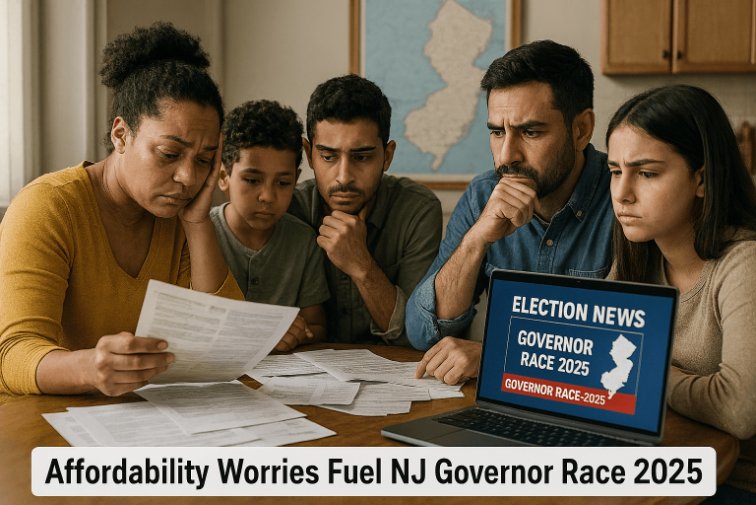Families Stretched Thin in the Garden State
In a bustling diner in Trenton, New Jersey, Maria Gonzalez sips her coffee, her eyes scanning the latest grocery receipt. With property taxes eating up 40% of her income and gas prices hovering at $3.50 a gallon, she’s wondering if she can afford another year in the state she calls home. As the 2025 race for New Jersey governor heats up, affordability has emerged as the defining issue, intertwining with national debates over former President Donald Trump’s policies. For families like the Gonzalezes, the election isn’t just about politics—it’s about survival in a state where the cost of living outpaces wages.
The Human Toll of New Jersey’s Cost Crisis
New Jersey’s high costs are hitting residents hard. Homeowners like Maria face median property taxes of $9,300 annually, the highest in the nation, while renters in Jersey City pay an average of $2,100 monthly for a one-bedroom. Inflation has eased to 2.5% nationally, but locally, utility bills and childcare costs remain burdensome. A single mother in Newark shared, “I work two jobs, but Trump’s tariffs on imports mean my kids’ school supplies cost more.” The race’s candidates—Republican Jack Ciattarelli and Democrat Mikie Sherrill, among others—must address these pains, as 62% of voters cite affordability as their top concern in recent polls.
Facts and Figures Driving Voter Anxiety
New Jersey’s cost-of-living index stands at 114.4, 14% above the national average, per the Council for Community and Economic Research. Housing affordability is dire: the median home price hit $495,000 in August 2025, up 5% from last year, making it harder for young families to buy. Gas averages $3.45 per gallon, influenced by global oil fluctuations and Trump’s energy policies. A Rutgers-Eagleton poll shows 58% of likely voters view the economy as their primary issue, with property tax relief and housing vouchers topping wish lists. Turnout projections suggest 4.2 million voters, potentially swayed by economic discontent.
Broader Political and Economic Context
The 2025 NJ governor race is “Trump-centric,” with candidates distancing or aligning with his legacy on tariffs and immigration, which impact local jobs in ports and farms. Trump’s 2024 win in the state by a slim 1.2% margin flipped the script, energizing Republicans like Ciattarelli, who promises tax cuts echoing Trump’s playbook. Democrats like Sherrill counter with progressive plans for affordable housing mandates. Historically, governors like Phil Murphy reduced taxes for seniors, but persistent issues like a $68 billion pension shortfall loom. Nationally, as the Fed cuts rates, NJ’s blue-collar workers fear uneven relief, drawing parallels to Rust Belt battles.
Key Issues in the Affordability Debate
Property Taxes and Housing Shortages
NJ’s property taxes fund 40% of local budgets, straining middle-class families. Candidates propose caps and incentives for new builds, but NIMBYism blocks progress.
Impact of Federal Policies
Trump’s tariffs have raised costs for imported goods, hitting NJ’s 500,000 manufacturing jobs. Immigration stances affect agriculture labor, vital to the state’s $1.2 billion farm economy.
What Lies Ahead for New Jersey Voters
With the November 4, 2025, election approaching, debates will spotlight affordability fixes: Ciattarelli’s 20% property tax cut vs. Sherrill’s $1 billion housing fund. Voter turnout could hit record highs, driven by independents (38% of electorate) frustrated with status quo. Advocacy groups push for ballot initiatives on rent control. As candidates tour diners and town halls, the winner will inherit a $55 billion budget and mandate to ease burdens. Global factors like oil prices add uncertainty, but local action on zoning and incentives offers hope.
Hope Amid the High Costs
For Maria Gonzalez and countless New Jerseyans, the 2025 governor race boils down to one question: Can leaders tame affordability worries in this Trump-centric contest? As polls tighten, the election promises not just a new governor, but a chance to rebuild trust in a state where dreams of homeownership and stability feel increasingly out of reach. With voter voices rising, change may finally address the bills piling up on kitchen tables across the Garden State.






